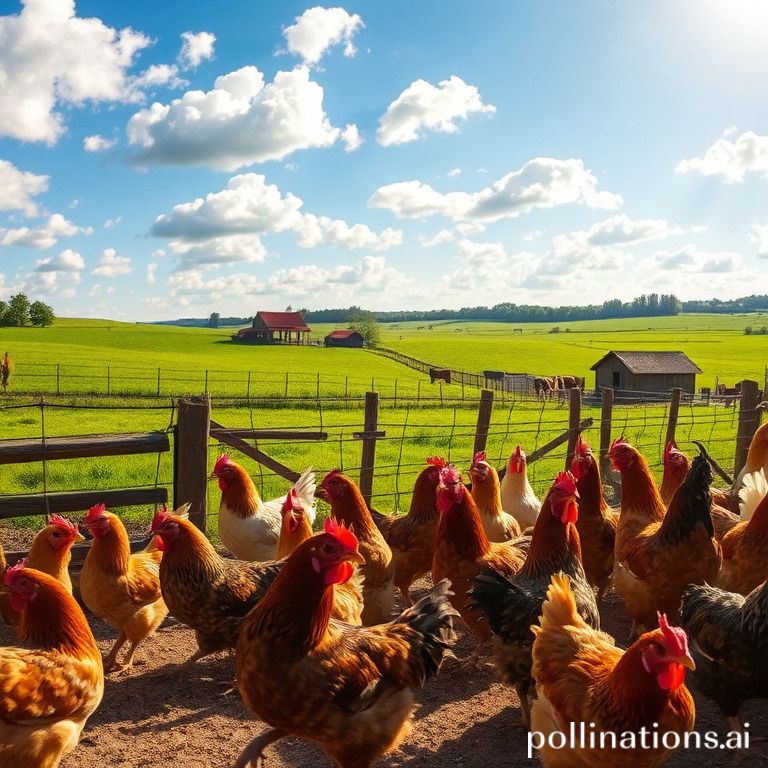But what can you do when your chickens just won’t stop making a ruckus? It’s a common problem that many chicken owners face – noisy chickens causing disturbances. Whether it’s the constant clucking, crowing, or squawking, it can be quite bothersome.
Luckily, there are ways to quiet your noisy chickens and restore peace and tranquility to your backyard. From simple techniques to effective products, you’ll find the solutions you need to keep your chickens happy and your neighbors even happier. So say goodbye to the noise and hello to a serene chicken coop with these proven methods.
Recognizing the Reasons for Noisy Chickens
Chickens can be quite loud, and it’s important to understand why they make so much noise. By identifying the root causes, you can find effective solutions that create a quieter and more peaceful environment for both you and your chickens.
1. Inadequate Housing or Limited Space
One major reason why chickens become noisy is because they don’t have proper housing or enough space. When chickens are squeezed into small or overcrowded areas, they can get stressed, agitated, and express their discontent through vocalizations. This is especially true if they don’t have enough room to move around, stretch their wings, or engage in natural behaviors.
To address this issue, make sure your chickens have a clean and spacious coop or run. Provide ample perches, nesting boxes, and roosting spots for each bird. You may also consider allowing your chickens to free-range in a secure area to give them more space and mental stimulation.
2. Stress or Boredom
Chickens, like humans, can experience stress and boredom, which can lead to excessive noise. Stressors such as loud sounds, sudden environmental changes, or the presence of predators can make chickens anxious and vocalize their distress.
To minimize stress and boredom, create a calm and predictable environment for your chickens. Avoid startling them with sudden noises or movements. Provide enrichments like perches, dust baths, and pecking toys to keep them mentally engaged and entertained. Additionally, make sure they have access to fresh water, a balanced diet, and appropriate social interactions with other chickens.
3. Hormonal Changes
During certain times of the year, such as spring, chickens may become more vocal due to hormonal changes. This is particularly common in roosters, who may crow more frequently to establish their territory or attract mates. Nonetheless, some hens may also become noisier when they are ready to lay eggs.
If hormonal vocalizations become a significant problem, consider keeping only hens or choosing quieter breeds. Alternatively, provide a separate enclosed space for roosters to minimize noise disturbances.

Implementing effective techniques to decrease chicken noise
Chickens can be quite noisy, but there are effective techniques you can use to decrease their noise levels. By ensuring appropriate housing and space, providing environmental enrichment, and managing their diet and nutrition, you can help reduce the noise created by your chickens and prevent disturbances. Here are some tips and methods:
1. Ensuring suitable housing and space
Proper housing and ample space are crucial in minimizing chicken noise. Make sure your chickens have enough room to move around comfortably. Consider providing separate areas for roosting and nesting to prevent noise disruptions during the night. Additionally, insulating the coop can help diminish the sound that escapes.
2. Providing environmental enrichment
Enriching your chickens’ environment can divert their attention from excessive noise-making. Give them objects to peck at, such as hanging cabbage or toys filled with treats. Creating a designated area for dust bathing can also keep them occupied. By keeping their minds and bodies engaged, they may be less likely to produce excessive noise.
3. Managing diet and nutrition
A well-balanced diet can contribute to quieter chickens. Make sure your flock is receiving the appropriate nutrients and feed them a diet tailored to their specific needs. Avoid overfeeding, as this can lead to obesity and increased noise. Additionally, consider providing calming supplements or additives that promote relaxation in chickens.
| Noise Reduction Techniques |
|---|
| 1. Ensuring suitable housing and space |
| 2. Providing environmental enrichment |
| 3. Managing diet and nutrition |
Using Behavioral Training Techniques to Address Noisy Chickens
When dealing with chickens that are noisy, it is important to use effective training techniques to address their behavior. By utilizing methods of positive reinforcement, maintaining consistency in training, and seeking professional help if necessary, you can successfully reduce noise and prevent disturbances caused by your chickens.
1. Positive Reinforcement Methods
One of the most effective ways to address noisy chickens is through the use of positive reinforcement. This involves rewarding desired behavior and redirecting or ignoring unwanted behavior. By providing rewards such as treats or praise when your chickens are quiet and calm, they will be encouraged to exhibit the desired behavior more frequently. It is important to avoid punishing or scolding your chickens, as this can cause stress and anxiety, leading to even louder noise.
2. Consistency in Training
Consistency is crucial when training noisy chickens. Establish a regular routine and stick to it so that your chickens understand what is expected of them. Set clear boundaries and consistently reinforce the desired behavior. For instance, if you want your chickens to remain quiet during specific hours, consistently reward them when they comply and redirect them when they become noisy. Over time, they will learn to associate quiet behavior with positive outcomes.
3. Seeking Professional Help if Needed
If you are struggling to control the noise produced by your chickens despite your best efforts, do not hesitate to seek professional assistance. An animal behaviorist or poultry specialist can offer expert guidance and personalized strategies to address the specific needs of your chickens. They can assess the environment, identify potential triggers for noise, and help you develop a comprehensive training plan to effectively manage their behavior.

Exploring natural remedies and supplements
Chickens can sometimes be noisy creatures, causing disturbances and disruptions. If you’re looking for ways to calm your chickens and reduce their noise levels, there are several natural remedies and supplements that you can explore. These remedies and supplements can help create a more peaceful and tranquil environment for both you and your chickens.
1. Herbal remedies for calming chickens
Herbal remedies have been used for centuries to promote calmness and relaxation in animals, including chickens. By fusing these natural remedies into your chickens’ diet or environment, you may be able to reduce their noise levels and create a more serene atmosphere in your coop. Some popular herbal remedies for calming chickens include:
- Lavender: Lavender has soothing properties and can help chickens relax.
- Chamomile: Chamomile is known for its calming effects and can be beneficial for anxious chickens.
- Valerian root: Valerian root has sedative properties and may help chickens stay calm and quiet.
2. The potential benefits of CBD oil for chickens
CBD oil, derived from the hemp plant, has gained popularity for its potential calming effects on humans and animals. Whilst research on the use of CBD oil specifically for chickens is limited, some chicken owners have reported positive results in reducing noise levels and anxiety in their chickens. It’s important to consult with a veterinarian before introducing CBD oil to your chickens’ routine, as dosage and administration may vary.
3. Nutritional supplements to promote calmness
In addition to herbal remedies and CBD oil, there are various nutritional supplements that can help promote calmness in chickens. These supplements provide essential nutrients that support their overall well-being and may contribute to a quieter and more peaceful environment. Some common nutritional supplements for promoting calmness in chickens include:
- Magnesium: Magnesium has a calming effect on chickens and can help reduce stress.
- Vitamin B6: Vitamin B6 is involved in the production of serotonin, a neurotransmitter that regulates mood and can help chickens stay calm.
- Omega-3 fatty acids: Omega-3 fatty acids have anti-inflammatory properties and may contribute to a more relaxed state in chickens.
Considering noise-reducing products and modifications
Chickens can be quite noisy, causing disturbances in residential areas. If you are facing issues with noisy chickens, there are several methods and products you can consider to reduce the noise. Here are some effective strategies:
1. Soundproofing the chicken coop
One of the most effective ways to minimize chicken noise is by soundproofing their coop. This involves adding insulation to the walls, ceiling, and floor of the coop. Insulation helps to absorb sound waves and prevent them from escaping the coop. Additionally, sealing any gaps or cracks in the coop can further reduce noise leakage.
2. Using white noise machines or music
White noise machines or calming music can be used to drown out the noise produced by chickens. These devices emit gentle and continuous sounds that can mask the chicken noises, providing a more peaceful environment. Place the white noise machine or play soothing music near the coop to help muffle the sound.
3. Installing noise barriers or baffles
Noise barriers or baffles can be installed around the chicken coop to block the sound from reaching neighboring properties. These barriers can be made of materials such as wood, concrete, or thick vegetation. Position them strategically to create a physical barrier that absorbs or redirects the noise away from residential areas.
Conclusion
Managing noisy chickens requires a proactive approach to create a peaceful environment for both the birds and their owners. By Perceiving the underlying causes of noise and implementing effective solutions, such as providing adequate space, proper nutrition, and engaging enrichment activities, chicken keepers can minimize excessive vocalization.
Additionally, addressing any underlying health issues and ensuring a calm and stress-free environment can further contribute to reducing noise levels. Remember, a harmonious backyard filled with contented and quiet chickens is achievable with patience, consistency, and a well-informed approach.
FAQ
FAQ 1: How long does it take for training techniques to work?
Training techniques can vary in effectiveness and the time it takes to see results. Albeit, with consistent training and positive reinforcement, you should start noticing improvements in your chickens’ behavior within a few weeks. It’s important to be patient and consistent in your training efforts to achieve the desired outcome.FAQ 2: Can I use essential oils to calm noisy chickens?
Yes, essential oils can be used to calm noisy chickens. Lavender and chamomile essential oils, when diluted properly, can have a calming effect on chickens. You can apply a few drops of the diluted oil in their coop or use it in a diffuser to create a soothing environment for your chickens.FAQ 3: Are there any specific breeds that are quieter than others?
Yes, some chicken breeds tend to be quieter than others. Breeds such as Sussex, Wyandotte, and Australorp are known for their relatively calm and quiet nature. Albeit, individual chickens within a breed can still vary in their noise levels, so it’s important to consider other factors like their environment and upbringing.FAQ 4: Is it possible to completely eliminate chicken noise?
In the course of it is difficult to completely eliminate chicken noise, there are measures you can take to minimize it. Providing a well-designed coop, keeping the chickens occupied with enrichment activities, and addressing any underlying issues that may be causing excessive noise can help reduce the overall noise levels. Remember that some level of noise is natural and expected from chickens.FAQ 5: What should I do if my neighbors complain about the noise?
If your neighbors complain about the noise from your chickens, it is important to address their concerns. Consider implementing noise-reducing measures such as providing soundproofing for the coop, relocating the coop to a more secluded area, or speaking with your neighbors to find a mutually agreeable solution. Good communication and Assimilating can go a long way in resolving any concerns about chicken noise.Read Similar Post:
1. How To Mix Corid For Chickens?
2. How To Grow Chickens Fast?

